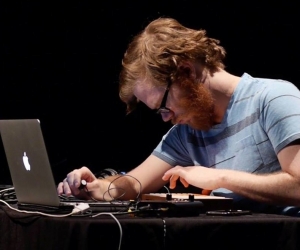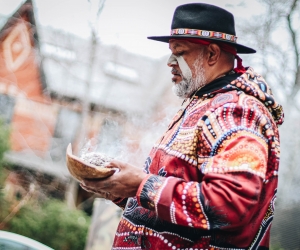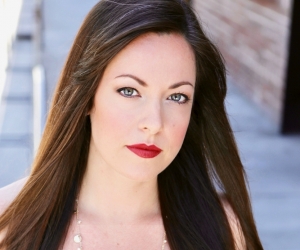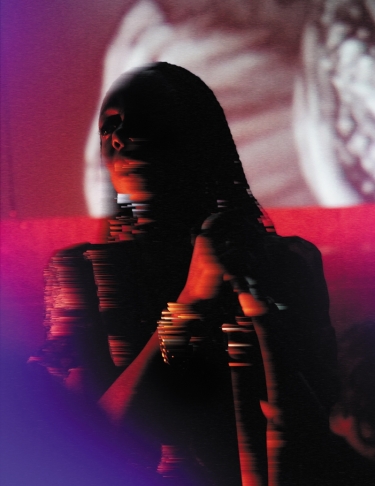
Across the first few minutes of Bare Bones, the short-film debut by Vancouver artist Debby Friday, a growing, skittering sound unsettles an otherwise pastoral scene. In the film, Friday, a splash of presence in a white tulle dress, kneels riverside amid a verdant landscape. This moment might feel serene were it not for its soundtrack: flitting strings establish tension and a low, humming voice augurs the transformative moment to come. The film hinges on this moment of transformation: Friday cups her hands to reveal a honey bee, the soundtrack evolves into a sequence of evocative couplets, incantations for a coming storm, and the unravelling begins: “Salt water / High grass / Holy daughter / Run fast.” If the song becomes a storm, then Friday revels in its fury: limbs now protracted in the low light of a ruinous building, she communicates her metamorphosis even if its precise details remain opaque. She’s swallowed the bee, been stung from the inside—and everything has changed.
In its distilling of a moment of transformation, Bare Bones feels emblematic of the work she has been making for the past number of years. Equally composed and wild, her noisy electroacoustic music stretches towards the edges of sense and sound. Like the woman we see on screen, Friday is restless, rigorous, expressive. And with two fluid EPs to her name and a debut LP on the horizon in 2021, she’s just getting started.
As Friday tells it, the character in the film simultaneously is and is not her; the woman who swallowed a bee is both a fabulist’s reverie and a sort of authorial unveiling. She made the film in July 2020, a few months after the COVID-19 pandemic overturned her plans for recording and touring. With her own world on its head and news of broader social transformation increasing every day, she took stock of how she was feeling, and she got to work. Film was a new medium for Friday, but unfamiliar territory hasn’t stopped her before. If anything, a natural autodidact, she was invigorated by uncertainty: “I had to do something,” she says, as if making the film were inevitable. “I could feel that things were changing, tectonic plates were shifting, not just underneath me but underneath the whole world. I wanted to represent this transformation that I am undergoing but also that we’re kind of undergoing as a collective, a global collective.”
The conceit of Bare Bones feels like something out of a myth or a legend—“if you want to go there,” she says (and I did), “it’s almost biblical”—but the idea came about through personal experience. Friday, whose first name, Deborah, means bee in Hebrew, says she has long felt a kinship with the insect, and takes seriously the meaning it signals in her life. During the past spring and summer, disoriented and uncertain about the future, Friday found she was seeing them more and more often: “perfectly preserved, just a bee on the sidewalk or on my windowsill or something.” She says she often encounters them in moments when change is blowing in—nature’s omens, abuzz with truth.
The bee, then, represents both herself and her potential for change. In swallowing the bee, the woman in Bare Bones incorporates this omen into herself, willing a radical transformation. I float this concept in one of my conversations with Friday, trying to ground myself in a stable meaning. Is the swallowing an act of incorporation or deep intimacy with the non-human? Or is it like she is swallowing a piece of herself—at once a self-effacement and an affirmation of her own variegated possibility?
Friday avoids settling for an easy answer. Imagination and speculation, she reminds me, emerge from our sense of the real. We’re always already folded in upon ourselves, pages torn from a book refashioned as paper airplanes. Or, in her words, “we are leading lives that are stories.”
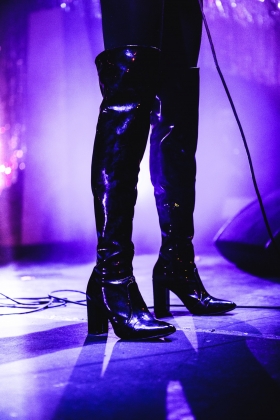
One version of the story of Debby Friday could begin in Europe. In 2016, having just completed undergraduate studies at the University of Ottawa, Friday fell for DJing after a friend invited her to spin records at a party. Disoriented after graduating, but committed to creativity, she joined a friend’s European tour, DJing for new people in new cities night after night, and drinking up the transcendent, collective afterglow of live music. “If I find something that speaks to me, I get very single-minded and focused,” she says. While Friday doesn’t cite a specific moment from this time that cemented music in her creative practice, that tour’s lessons permeated her outlook thereafter—a diffuse sort of transcendence, but no less real because of it.
“I saw so many music communities filled with young people who just loved music and loved art and were just doing whatever they wanted,” she says. “It expanded my world view, completely and totally. . . . And at the same time, a lot of stuff in my life was just falling apart and coming undone. Now, looking back at it all, I can see that those structures were falling apart because they just didn’t fit me anymore.”
DJing was not exactly what Friday was looking for: not long after getting back to Montreal, she “quit nightlife,” as she puts it, and got sober, leaving behind parts of who she thought she was and making room for even more change. She hadn’t yet found her sound, but she’d found an opening: “Okay, if anything is possible, then what is it that I actually want?”
On Friday’s 2018 EP Bitchpunk, her debut release as Debby Friday, you can sense the shimmering initial glimpses of that possibility. In the first seconds of the record, a synthesizer arcs across frequencies and a voice announces it as something different: “c’est quoi ça, le bitchpunk?” What is bitchpunk—is it a genre, an idea? Through the EP’s six tracks, Friday presents something of an answer: an exhilarating blend of noise and hip-hop beats, at once pummelling and sensual, machinic and supple. The songs are technically complex but also offer a basal immediacy— Bitchpunk sounds made to move to.
In her lyrics, Friday lays out a set of principles for her work that she has circled back to again and again: responsibility, desire, power, noise. On “Stay Up,” riding a fraying beat, she becomes as huge as the moon: “And I wax and I wane / And I swell and I heave / And I’m bigger I’m bigger I’m bigger I’m bigger I’m bigger I’m bigger I’m.” Later, on “Indulge Me,” her voice curls its upper register around industrial pulses and arpeggiating synths. “Fuck the silence,” she shouts on the refrain, “I love this violence.” Across genres and tempos, the tracks are shot through with Friday’s emotive vocals—variously a shout, a taunt, and a tease. She sings wildly, like she’s getting closer to the blinding core of what makes us human: our capacity to make noise, to be together, to fuck up.
Attending to these foundational ideas nurtured on Bitchpunk shows how the seeds of Debby Friday (her stage name) were sowed earlier than her days as a DJ. Friday’s early years in Nigeria and her childhood in Montreal were saturated equally by the church and an insatiable curiosity about the meaning of the world. As a teenager, Friday would listen to anything she could find online, spending hours on file-sharing services like Limewire and Kazaa. She was hungry to hear a full range of sounds and ideas, wandering her way toward an eclectic taste in music. Hers were young ears trained by the brassy exaltations of gospel music and the liberating, life-affirming rhythms of Afrobeat.
“I think that [Bitchpunk] was very syncretic in a way,” she says. “It was me trying to synthesize all these different bits and pieces of me, all these different influences and things that I’ve grown up listening to and things that I’ve liked, into one voice that is coming from me—my own unique way of being, almost.”
Shortly after she self-released Bitchpunk, Friday left Montreal—another bee, another opportunity to shed what wasn’t working and transform. She moved to Vancouver to begin an MFA in Interdisciplinary Arts at Simon Fraser University and quickly felt at home in the city’s arts scene. Going back to school reinvigorated her interest in multidisciplinary practice and bolstered the theoretical pillars of her work. “I like to do many things at once in order to fully express myself,” she says. “I think I need a lot of different avenues and different ways of combining . . . taking it apart, putting it back together, taking it apart, putting it back together . . . I really like that whole process.” (Friday keeps a blog, Cracking Closer, where this intellectual process becomes even more apparent. Recent essays explore the aesthetic experience of shouting and the erotic potential of electronic punk music, and cite a broad range of writers, from queer-theory luminary Jack Halberstam to sci-fi icon Octavia Butler.)
In Vancouver, she also began working on Death Drive, her darker, ornerier, EP follow-up to Bitchpunk. Here, she trades her debut EP’s industrial bombast for a more languid sensibility and an expanded palette of references. The title Death Drive comes from the notion originated by psychoanalyst Sabina Spielrein—and later expanded and popularized by Sigmund Freud—that we carry an innate posture towards destruction. On closing track “Neight Fictive,” Friday toys with the idea by imagining herself into the charged consciousness of a crucifixion scene: “Oh god, what have I done? I killed my baby, your only son.” Later, American experimentalist Chino Amobi reads from a dense manifesto called Introduction to Civil War (2010), published anonymously by the French leftist journal Tiqqun: “A body leans toward whatever leans its way. This goes for each and every situation. Inclinations go both ways.” On Death Drive, Friday adopts the dialectical, self-reinforcing inclinations of the powerful and the meek. It’s a remarkable composition, buoyed by an urgent interest in contending with what it means to hold power and responsibility.
“When you’re confronted with your power as a human, it’s immense, it’s overwhelming; sometimes it’s too much. What do you do with the fact that you have that power? . . . That is where I was with all of that, and thinking as well on a global scale, like—what have we done as human beings? Look at us: so self-destructive! Look at all of the things we’ve destroyed, all of the ways that we’ve hurt each other.”
Friday is currently in the thick of making her next record, an LP, which she plans to release sometime in 2021. She says this next album will serve as the culmination of a sort of trilogy, with Bitchpunk and Death Drive. But it’s also a step forward: she’s working with outside producers for the first time, testing the limits of what she thinks is a song, and imagining new ways to support her sound with visuals. In the year to come, she also hopes to wrap up her MFA thesis, which she calls a “sonic drama,” and also lean further into filmmaking, with plans for a new, longer project in the works. As Friday looks ahead to the next steps of her practice, that durable idea of responsibility remains at the forefront of her mind. Even amid the tumult of 2020, her life feels filled with creative opportunity—and this feeling isn’t one she takes lightly.
Near the end of our first conversation, she quotes an infamous adage from Afrobeat leader Fela Kuti: “Music is a spiritual thing. You don’t play with music.”
“Music is a spiritual thing,” she continues, emphasizing her conviction. “It’s a spiritual part of the human experience, it allows us to connect on the spiritual plane, connect with each other, connect with ourselves, connect with things outside of ourselves, outside of this world even. That is a responsibility. I am a firm believer that responsibility is the pathway to freedom.
“I feel there’s also this sense of liberation coming with [this new album],” she says. “It’s going to sound so different, but it’s also so true to who I am and who I’m becoming. . . . My only goal with art is to be able to be more honest. I want to get to a place where I can just be as honest as possible with the things that I’m saying, the songs that I’m singing, and the sounds that I’m making. And so, I think with this record, I’m getting more honest—always more, more, more.”
